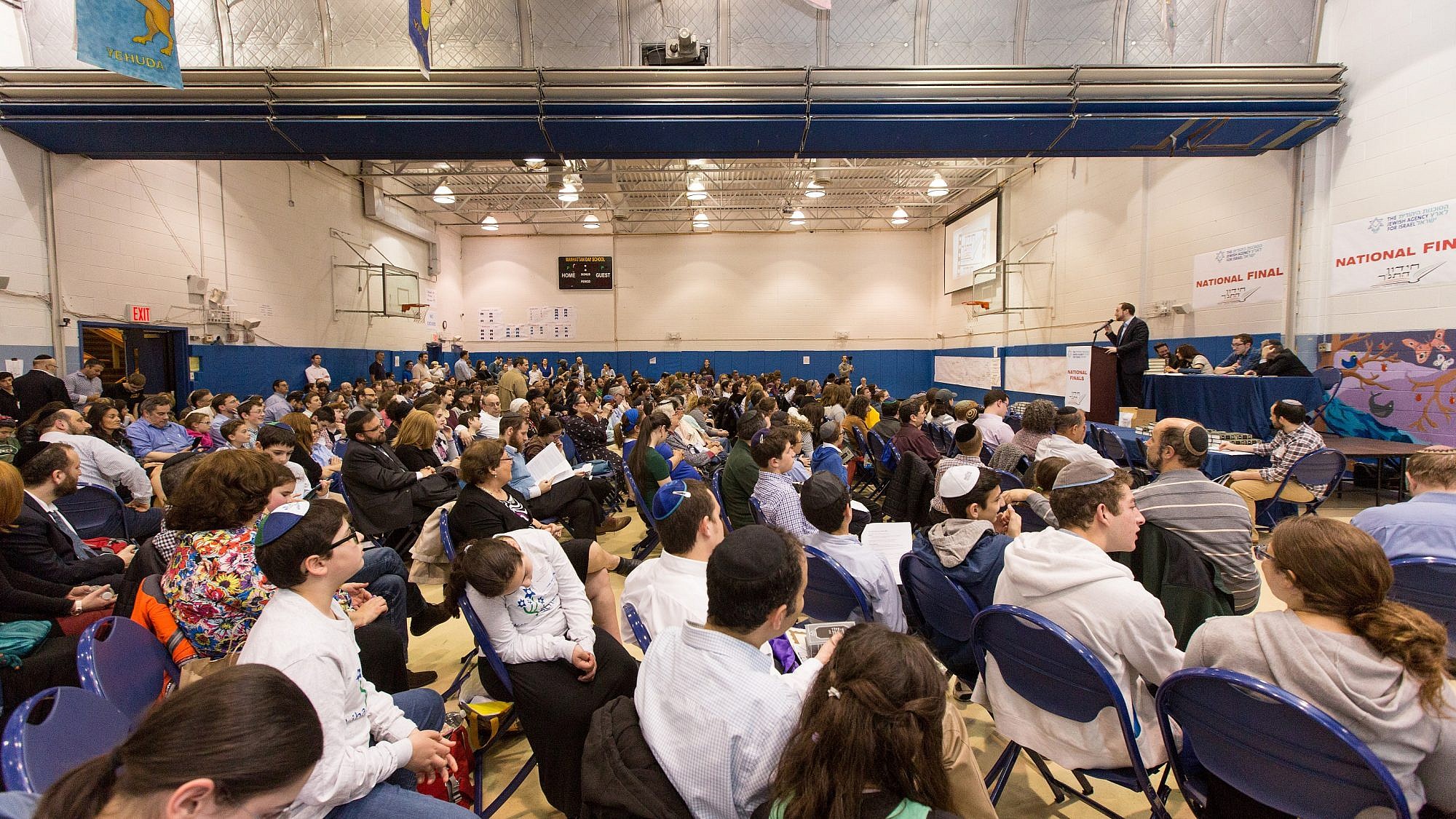The room is hot and overcrowded, but you can hear a pin drop as the national winners are announced. It’s been a year filled with getting up early, sometimes staying hours late after school, and often, meeting with teachers or coaches on Shabbat or Sunday just to get here. But all 200 students arrived in Manhattan as national finalists—a major achievement.
The energy and excitement are palpable at the U.S. Finals of the Chidon HaTanach, or “Bible Quiz,” which is a worldwide contest run annually by the Jewish Agency. Tanach is an acronym composed of Torah (“Teaching,” also known as the Five Books of Moses), Nevi’im (“Prophets”) and Ketuvim (“Writings”). It contains the canonical texts that comprise the Hebrew Bible, which is made up of 24 books composed mainly in biblical Hebrew, with a few in Aramaic.
With competitors from more than 60 countries, the Chidon HaTanach is the ultimate Jewish trivia game that makes the oldest book in the world entertaining and engaging. It’s a test of skill, memorization and comprehension, but the foundational lessons of the Tanach—the byproduct of learning it—are complex enough to keep a reader’s attention for a lifetime. (Sample question: “Who said to whom: ‘Am I really unable to reward you?’ ” Choose from the following answers: A) Nechemia to Artaxerxes; B) Aaron to Moses; C) David to Barzilai; or D) Balak to Baalam. Answer is at the end of this story.)
The final event, which is televised every year in Israel on Yom Ha’atzmaut, has a dedicated base of fans, young and old, all over the world. American Jewish students as from sixth grade all the way through 11th congregate each spring in Manhattan to choose the U.S. winners, who then continue on to the competition in Israel the following year.
The U.S. qualifying event, held this past Sunday at Manhattan Day School, determined the winners who will head to the Jewish state for Yom Ha’atzmaut 2019. The event is very much a national affair. Participants came for the first time this year from the Jewish communities in Phoenix, Ariz.; Omaha, Neb.; and North Carolina. These neophytes joined a whopping 14 students from a single school in Memphis. Delegations also made the trek from Maryland, Florida, Los Angeles, St. Louis, Chicago, Cleveland, Detroit, St. Louis, Boston, Columbus, Philadelphia, and, of course, the tristate area.
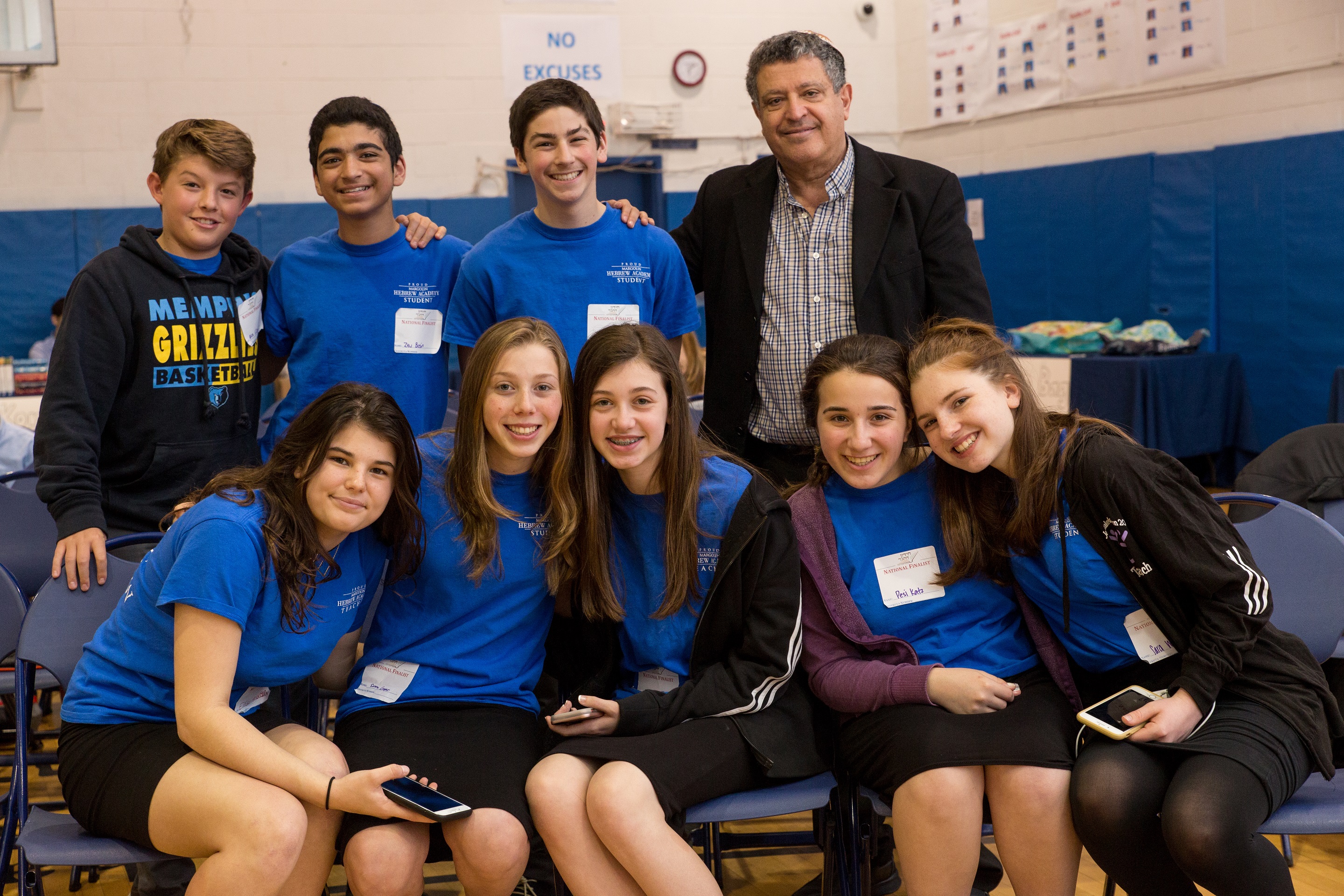
The event is also equal opportunity for both English and Hebrew Tanach learners. Individual registrants, i.e., students who are homeschooled, attend public or prep schools (17 national finalists fit this category) and others who wish to compete in English join Jewish day-school students who generally compete in the Hebrew version of the game in several age groups.
‘The competition part really pushes me to learn’
Matti Schinasi, a Chidon coach and a Hebrew teacher at Akiba Schechter Chicago Jewish Day School, shared that she has been bringing students to the Chidon for the last 11 years. This year she brought four students, doubling the numbers of competitors from last year. “What I love about the Chidon is the challenge, the excitement and the knowledge that comes with it, and to see the students who want to learn, and how they work together and challenge each to do their best. They motivate me to do my best to help them,” she told JNS.
Judah Guggenheim, a 10th-grader who returned this year for the fifth time to compete in the Chidon, goes to the Melvin J. Berman Hebrew Academy in Silver Spring, Md. Chidon at Berman exists as a club as opposed to an elective class, with most of the students doing the majority of their prep outside of school. This requires students to commit to Chidon HaTanach on the same level, essentially, as they do for a varsity sport. “It’s great, because it means people who are doing it are really committed to learning Tanach for its own sake, not just for a class,” he said.
Guggenheim noted that while he was looking forward to seeing the results, he was not concerned about winning or losing. “I come with the mindset that I’m here for the experience, and I think no matter how we do here, we have learned a tremendous amount, and that’s always going to stay with us, no matter what,” he said. “We are having a great time, meeting people, learning, taking the tests. It’s a lot of fun!”
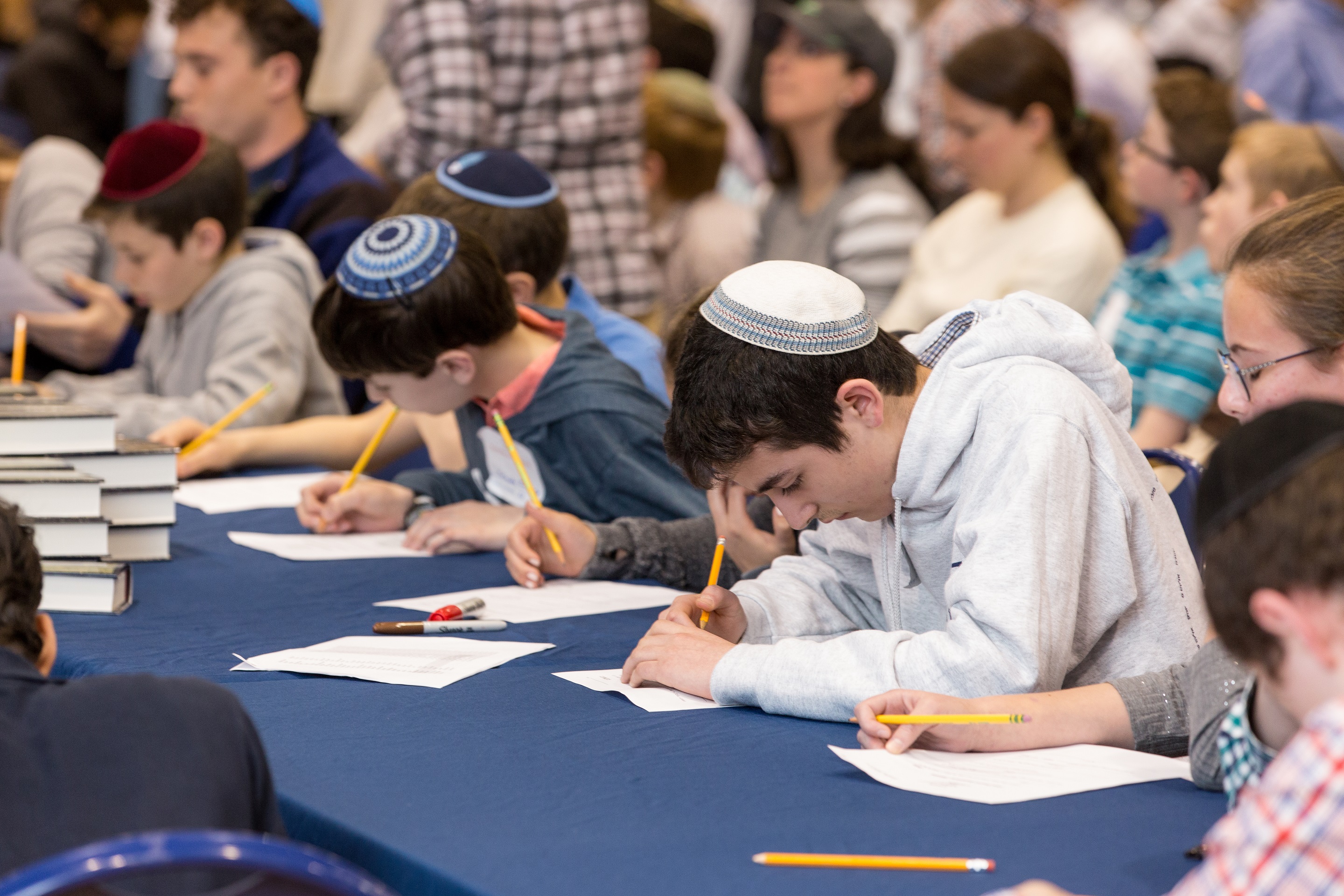
Arielle Levy, an eighth-grader from Paramus, N.J., who attends Yavneh Academy, said “coming here makes me feel accomplished that I learned so much. “I feel like when I learn for the Chidon HaTanach, the competition part really pushes me to learn and to want to learn more.”
“Of course, I do love a trip to New York, always, but also love learning the actual text of the Tanach, learning not the commentary but exactly what the Tanach says,” chimed in Aaron Faier, an eighth-grader at Akiba Schechter Jewish Day School in Chicago. “In school, you don’t always learn the text exactly, and this is one thing I love about Chidon.”
‘Everyone is really a winner’
Dovi Nadel, the U.S. coordinator the Chidon for the Jewish Agency, shares a syllabus at the beginning of each year’s cycle, which breaks down a list of what students must study. Luckily, the entire Tanach is not fair game on the tests—just the named books and verses. This year’s material was Genesis, Joshua and a number of chapters in Psalms. The Hebrew high school also had Ezekiel on its syllabus. Students take a qualifying written example administered by their home communities in the winter, and if they make it to New York, they take another qualifying exam; there is also a live component, with participants competing by SMS texts.
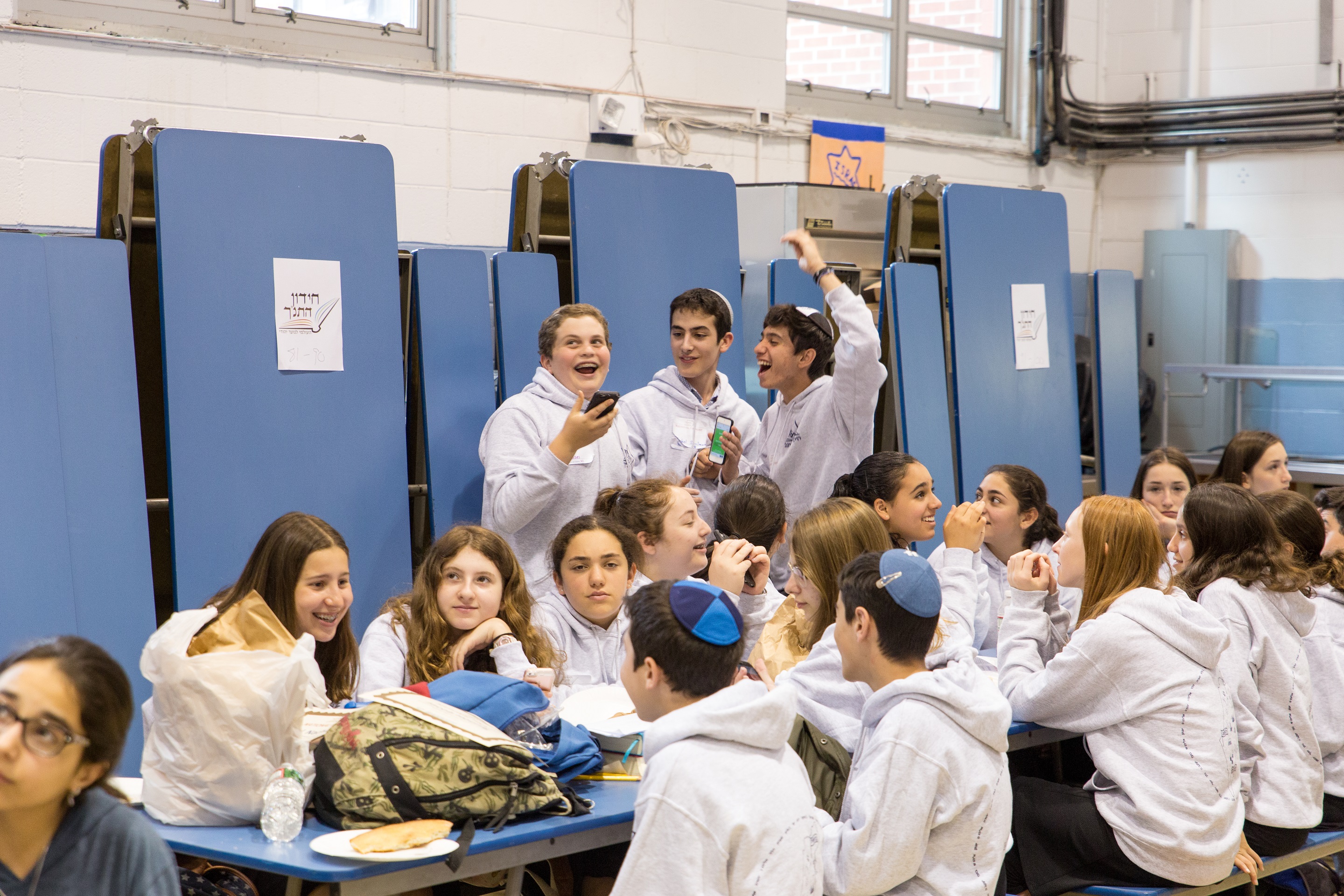
“We’ve got 500 people who participated over the course of the year in the Chidon HaTanach, which is over 150 more than we had last year,” Nadel told JNS. “We invite the top 200 to compete in three different divisions; one is the Hebrew high school division, Hebrew middle school and an English division. Our middle school division is our largest, followed by our English and high school, which have around the same amount of students.”
Nadel shared that there is a special experience that goes along with being a national finalist. “We have a carnival, we have lectures, the kids have a chavruta [a learning partner matched up from another community] and the kids write their favorite pesukim [verses] on the board,” he added. “The idea is: Four people are going to win, and that’s great; kudos to them. We can’t wait for them to be our representatives in Israel. But everyone is really a winner.”
‘The instrument to learn about Judaism’
Another coach gaining a lot of nachas (pride) from his students was Shimshon Solomon, who, along with colleague Anat Kampf, brought 14 students from the Margolin Hebrew Academy in Memphis, Tenn. Solomon, who has taught at Margolin for the past 10 years, has been working as an Ivrit B’Ivrit (Hebrew immersion) teacher in Jewish communities in Europe, Canada and the United States for the past 35 years.
“We started sending children to the Chidon, starting with four kids seven years ago,” he said. In his school, children have to know Hebrew in order to participate. “We teach them [entirely] in Hebrew. Over the years, the numbers have increased, and the children learn two hours during school hours and two hours after school. One hour during Shabbat, they volunteer to come. It’s not easy for them, but the reason they are motivated to come is because the parents are motivated and excited, and the school is motivated and excited about Chidon.
“I believe Hebrew is the instrument to learn all about our Judaism, our identity and who we are,” continued Solomon. “We love the Tanach, and this is, I think, a way to help the children to like the Tanach. Yes, they have to work very hard, be very dedicated, in order to make it to Israel. We had a girl a couple of years ago who came in fourth place in the U.S. Chidon, and we had some students in the past who have gone to Israel. The children know about it, and they want very much to win. To tell you the truth, it’s not easy.”
Rabbi Ezra Frazer, who stepped down several years ago as the U.S. Chidon coordinator, is still active in the program. As a former Israel Chidon competitor himself as a teen, it’s almost as if he can’t not attend the Manhattan event; it’s in his blood.
After attending so many national finals competition, what is his takeaway?
“I think there is a big deal made about the winners, but there are some here just for the experience. You really see that across schools, across communities, across town, across hashkafic [observance level] lines, it’s not just for one sub-segment of the Jewish community,” said Frazer.
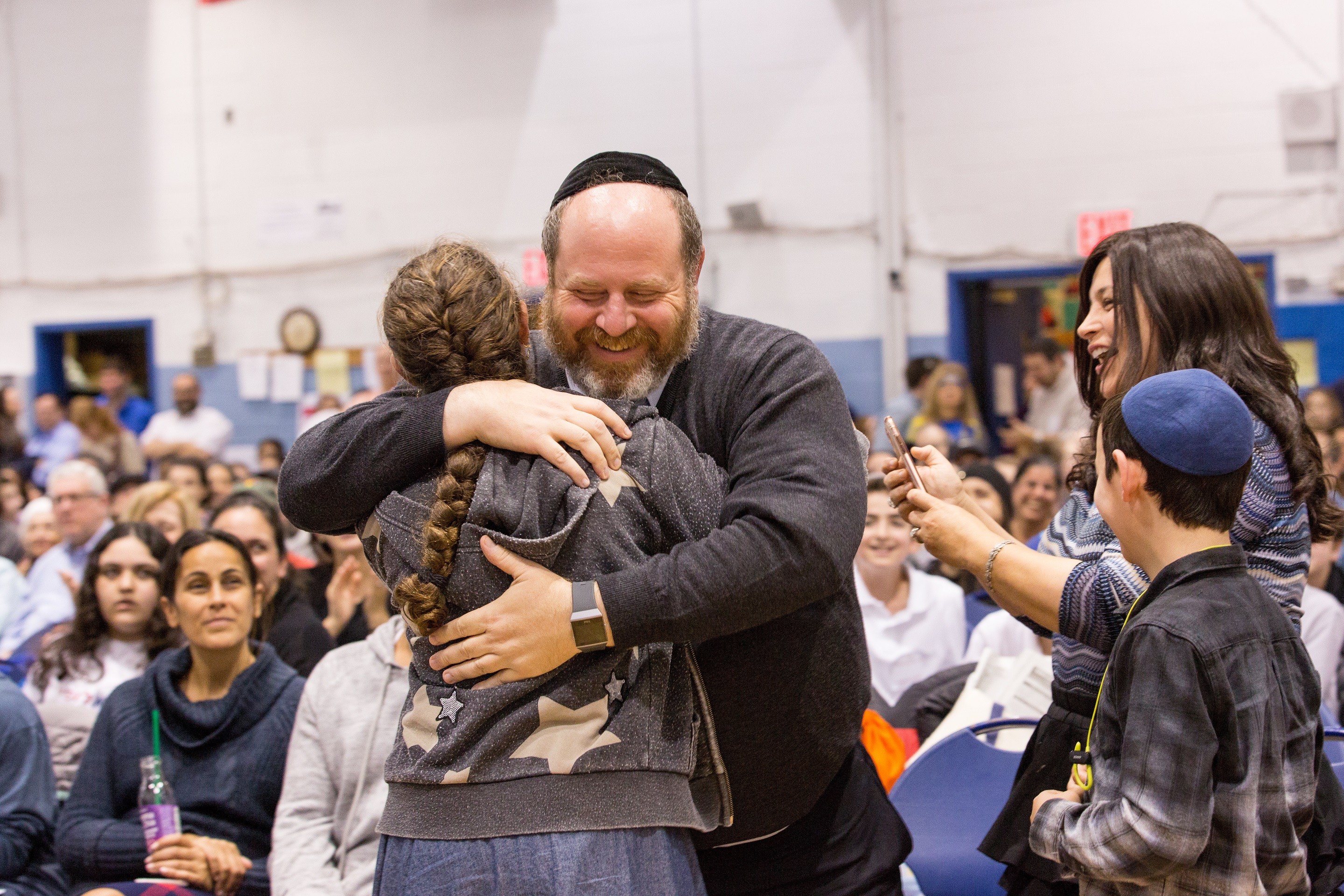
Placing and winning in the English 8-11 division were Mori Schacter (Donna Klein Jewish Academy, Boca Raton, Fla.), Daniel Stein (a private registrant and a student at Brownell Talbot, Omaha, Neb.) and Elianna Sokoler (Temple Aliyah, Los Angeles). In the Hebrew High School division, winners were Akiva Sturm (Torah Academy of Bergen County, Teaneck, N.J.), Jacob Colchamiro (Rae Kushner Hebrew Academy, Livingston, N.J.) and Nathanael Vinar (Torah Academy of Bergen County, Teaneck, N.J.). In the Hebrew 8 division, winners were Ariella Frohlich (Yeshivat Netivot, East Brunswick, N.J.), Yechiel Shulman (Epstein Hebrew Academy, St. Louis) and Bracha Wolin (Torah Day School of Phoenix, Ariz.). Winning the Hebrew 6-7 division were Micah Cyrulnik (Yeshivat Noam, Paramus, N.J.), Noam Fensterheim (Hillel Torah North Suburban Day School (Skokie, Ill.) and Yehuda Zinberg (Yavneh Academy, Paramus, N.J.). Top placers in the English 6-7 division were Aiden Gitlitz (Beth Tefiloh Dahan, Baltimore), Talia Weinstein (Beth Meyer Religious School, Raleigh, N.C.) and Andrew Shindel (Beth Tefiloh Dahan, Baltimore).
Nathanel Vinar, Jacob Colchamiro, Yechiel Shulman and Elianna Sokoler will all go on to represent America next year in the International Chidon HaTanach.
(And the answer to the sample question? If you guessed “D,” then you are correct!)
Schools and individuals interested in getting involved in the competition should contact Dovi Nadel at the Jewish Agency: dovin@jafi.org.


























